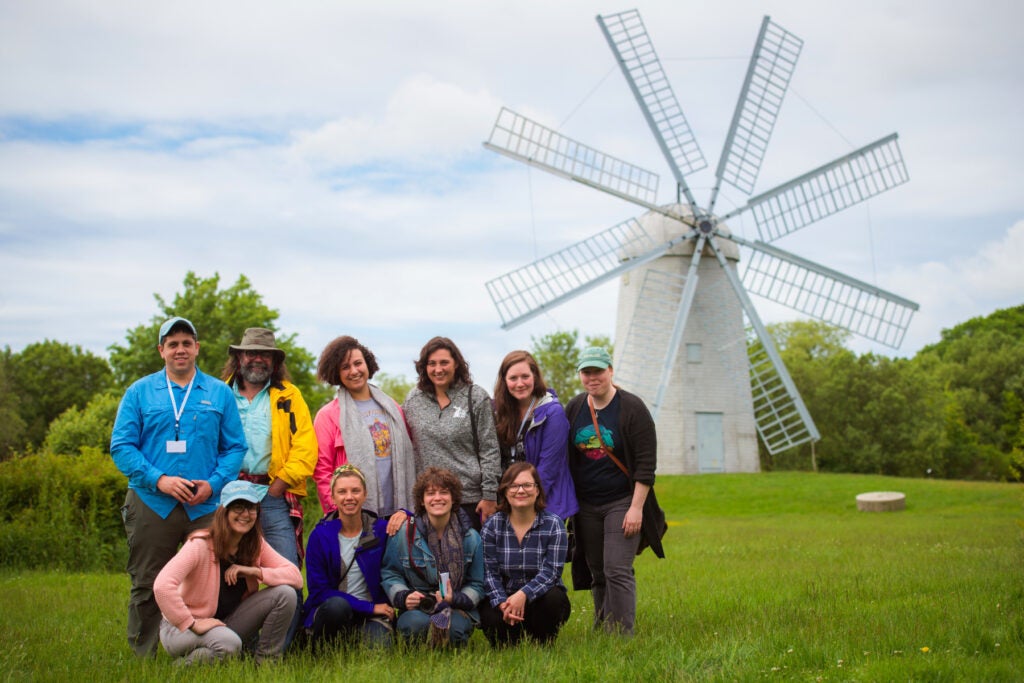2017 Annual Science Immersion Workshop for Journalists

The 2017 Annual Science Immersion Workshop for Journalists, June 4 -9, helped the journalists sharpen their research and reporting skills by putting them directly in the field, laboratory, and classroom to gain a deeper understanding of how scientists approach, conduct, and analyze their research. The Metcalf Fellowship provided critical context for environmental stories, built journalists’ confidence in translating complex scientific data, and gave them a unique opportunity to engage with top scientists. Metcalf Fellows left the workshop with the background, tools, and sources to break stories on a range of environmental topics.
The workshop took place at the URI Graduate School of Oceanography, one of the nation’s premier research institutions with a global reputation for excellence in marine research and exploration of the world’s oceans and coasts.
“The Metcalf workshop was invaluable for my career in science journalism,” said Alessandra Potenza, associate editor, The Verge. “Meeting other inspiring science journalists from all over the world and hearing about their experience in the field made the whole experience even better.”
The Fellows spent a rigorous week at the University of Rhode Island Graduate School of Oceanography immersed in a range of activities as they studied global change in coastal ecosystems.
A science translation exercise provided insight into the peer review process, tools for distilling relevant information from scientific journals, and a unique understanding of how researchers vet their work. The journalists also studied coastal management and sea level rise, land use effects on water quality during extreme weather events, and observed, first-hand, how marine fisheries surveys are conducted.
“My experience at the Metcalf Science Immersion Workshop greatly deepened my understanding of the climate change topics we cover regularly in the media,” said Lindsay Fendt, freelance reporter and photographer. “My time here has opened me up to new story ideas and I believe it will drastically improve my reporting in the future.”
“I didn’t know how much I didn’t know,” explained Tegan Wendland, reporter, WWNO New Orleans Public Radio. “From reviewing the basics of climate science to learning about the uncertainty of hurricane prediction models, Metcalf has greatly enhanced my ability to break down complex issues for my audience.”
The following journalists were part of the 2017 Metcalf Fellowship cohort:
- Meredith Bauer, freelance journalist, Dublin, California
- Kimberly Cauvel, environment reporter, Skagit Valley Herald, Mount Vernon, Washington
- Megan Darby, deputy editor, Climate Home, London, England
- Lindsay Fendt, foreign correspondent, San Jose, Costa Rica
- Ashley Fitzpatrick, reporter, The Telegram, St. John’s, Newfoundland
- Aya Nader, freelance journalist, Cairo, Egypt
- Alessandra Potenza, associate science editor, The Verge, New York, New York
- Maurice Tamman, reporter and editor for Reuters News, New York, New York
- Tegan Wendland, reporter, WWNO-FM Public Radio, New Orleans, Louisiana
- Daniel Woolfolk, multimedia journalist, Sightline Media Group, Vienna, Virginia
View Previous Annual Science Immersion Workshops:
2016 | 2015
